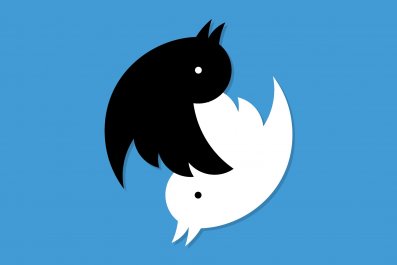Updated | The Brexit vote. President Trump. The upending of political norms. "Seismic events; for some it must've been really exciting," Tom Walker says. "I've just had to try to find a way [through]." Walker—38, light-haired, baggy-eyed and British—is an actor. He is also Jonathan Pie: embittered, embattled TV news reporter and internet phenomenon, who is about to embark on a live event, a 22-date, sold-out tour around the U.K. It's all happened very fast.
Jonathan Pie first appeared online in September 2015, in a handful of monologues that Walker wrote, recorded and uploaded on YouTube. Each weekly clip began with the reporter delivering the end of a straitlaced piece to camera, the kind of thing we all see on the evening news, a man in a suit and a coat standing with a mic in front of the Houses of Parliament. But then, while waiting for his cameraman to reset, he would begin to unburden his soul, ranting increasingly wildly about modern life to his unseen producer, Tim. The satire worked on several levels, partly needling politics and politicians but also taking aim at the media. Where Steve Coogan's Alan Partridge, 20 years earlier, exposed the self-regard and stupidity of a certain kind of sports commentator, Pie lays bare the gap between the slick, blank-eyed presentation of news stories, and the social fury that bubbles beneath.
The character was born out of necessity, rather than desire. "I'd been out of work for a long time and just wanted to write something," Walker explains. Making most of his money as a stage actor, Walker's highest-profile role at that point had been playing Puck for an opera company in the north of England; the closest he'd come to the big time was a stint as an understudy in the West End version of The 39 Steps. Pie was a character he'd had in his head for a while; the name was one he'd used as an alias at a few standup nights in pub backrooms. He shares some characteristics with his creation: Both are left-wing and liberal. "I don't think I could write for him," Walker says, "if I didn't agree with his politics." But Pie takes those beliefs to their extreme, shouting down opponents in a tangled, profane rush of misanthropy and ire.
Four or five weeks after uploading his first monologue, a three-minute rant —covering the U.K.'s plans to bomb Syria, housing policy and Matt Damon's views on sexuality in Hollywood—went viral, getting 1 million views. Since then, his audience has grown exponentially: Pie's most-viewed recent video—a six-minute, post–election night diatribe against the mainstream media for not predicting Donald Trump's victory—has been seen more than 23 million times on Facebook. It was funny, yes, but it was more than that. Before Pie signed off with "Right, I need to go for a shit and shave," his dissection of the failings of the inward-looking metropolitan elite to engage with their opponents felt both righteous and right. "Whether you agreed with it or didn't—and a lot of people didn't," Walker says, "it made people realize that Jonathan Pie wasn't just a flash in the pan."
New Year: New Pie?Pie vows to stop swearing and start listening!
Posted by Jonathan Pie on Sunday, January 8, 2017
The character who has become the Stephen Colbert of the internet—a polemical satirist turned commentator, with hundreds of thousands of online fans—was never meant to be overtly political. One videoed rant against soccer, the English national sport, garnered a comparatively low number of views, while Pie has also taken against Valentine's Day. And Australia. "The politics was always secondary. It was never supposed to be politics every week," Walker says.
But politics has dogged him, not least in one of his more controversial career moves. Within months of Pie's debut, the Kremlin-funded television station RT spotted his videos online, and offered to pay him in return for broadcasting them on their TV channel. Pie agreed. "Let's be honest," he says. "I'd been out of work for a very long time. I was literally on the poverty line." The gig got him a new and larger audience, but it quickly became a problem. By aligning himself with what many in the West view as a propaganda outlet masquerading as a news channel (RT has been censured by Ofcom, the U.K. broadcast regulator, more than a dozen times for misleading and biased reporting), he attracted criticism "from a lot of people, [which] I totally understand." He severed the tie in July last year, and he says that artistically the decision to take money from RT didn't make a difference: The channel had no creative input into his videos.
Walker doesn't work alone on his videos: Increasingly, he is enlisting the help of comedy writer Andrew Doyle to craft his monologues. "Writing is a discipline, much more than acting is," Walker says. "You've got to sit down and do it, and the blank page scares the hell out of me." So when it comes to putting words to paper, Walker has developed an unusual method. He starts the timer function on his phone, setting it to run for one hour. "If ever my mind gets distracted I just look at the watch and go: 'You've only got 40 minutes left, keep going.' Then by the end of the hour you hope you've got something."
Read more: Why Europe's populist revolt is spreading
As soon as he finishes filming one week's segment, he immediately thinks about the next. Finding the topic each weekly video will cover can sometimes be difficult in a fast-moving and increasingly chaotic news cycle, and ideas can arrive in the oddest places. "Yesterday inspiration struck in the middle of Sainsbury's [supermarket]," he says, "and I had to stop and make notes on my phone in the frozen goods aisle."
The live tour of a show that comes in at just under two hours poses different problems. He's currently rewriting the script, but world news keeps shifting faster than he can keep up. "The script needs a total rewrite," Walker says, exasperated. "I'm used to [learning the script for] a play that's been written 300 years ago, and there's no changing it. You learn it and do it. This is constantly changing."
Working live will mean he will likely have to deal with hecklers—although he's already used to being trolled. Not everyone recognizes that Pie is a satire, and viewers who disagree with the character's opinions often use YouTube's comments section to throw abuse at his creator. "That wouldn't have been the case 10 years ago," Walker reckons. But now, in a post-experts, post-truth world, the line between satire and reality has become blurred. "At the end of the day all I'm really trying to do is make people laugh," he says, "and maybe look at the world in a slightly different way." It doesn't look as if he has much choice, though. However uneasy Walker is with the role, his creation seems to have made the transition from a joke to a serious player. And that's a story we know all too well.
For tour details, see here.
Correction: The original article incorrectly said that this was Jonathan Pie's first live event when, in fact, the character has appeared on stage before.























